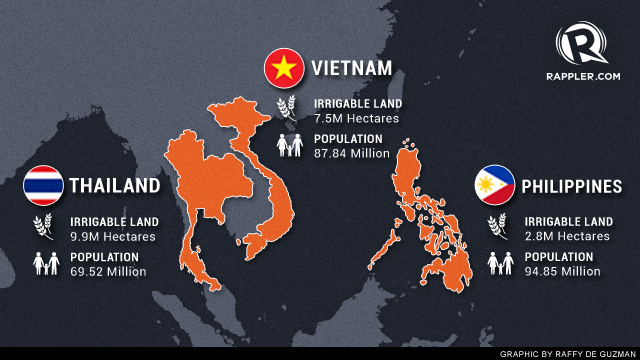SUMMARY
This is AI generated summarization, which may have errors. For context, always refer to the full article.
MANILA, Phiippines – The National Irrigation Administration (NIA) is a poor performer, given its budget allocation, a civil society organization said on Thursday, July 4.
Rice Watch and Action Network or R1 pointed out that NIA has shown a low accomplishment rate in generating new and restored irrigated lands.
R1 is a coalition of different non-governmental organizations in the agricultural sector dedicated to research, advocacy, networking and organizing for action for economic reforms.
“Malaki ang budget pero mababa ang accomplishments nila,” said R1 co-convener Jessica Ray-Cantos. (Their budget is high but their accomplishments are low.)
President Benigno Aquino III recently fired NIA head Antonio Nangel because of the agency’s poor performance.
Self-sufficiency
The country continues to depend on its neighboring Asian countries for rice despite available vast agricultural lands.
According to the spokesperson of the National Rice Farmers Council, Jaime Tadeo, this is because of the small number of irrigable lands in the country.
“Sana ang irrigation system natin ay made-develop natin, yun ang pinapanawagan namin. No water, no crops. Water is the controlling factor in any crop production,” said Tadeo.
(We are appealing that our irrigation system be developed. No water, no crops. Water is the controlling factor in any crop production.)

Thailand and Vietnam, two of the leading exporters of rice in Asia, have 9.9 million and 7.5 million hectares (has.) of irrigable land for a population of 67 million and 85 million, respectively. On the other hand, the country is behind with only 2.8 million has. of irrigated land for a population of 97 million.
Stagnant results
The Aquino government raised and prioritized the NIA budget to solve this problem, making irrigation the primary determinant for rice self-sufficiency.
NIA was allocated P90.6 billion from 2010 to 2013. This is 36% higher than the agency’s requested budget of P78.79 billion to achieve its food staple sufficiency program (FSSP). With this figure, the government agency targeted the creation of 312,823 hectares of irrigable lands, sought to restore 312,261 hectares, and rehabilitate 787,352 hectares within a 4-year span.
However, their actual accomplishment clearly tells a different story.
For the past 3 years, the government agency has consistently generated low accomplishments for new and restored irrigated lands.
In 2010, the agency was able to generate only 50% of its new irrigated lands target; 76% of areas eyed for the restoration of irrigation systems, and 78% of the targeted rehabilitation of irrigation systems.
In 2011, NIA was able to accomplish 71% of its target for new irrigated areas; 56% of its restoration target; and 106% of lands for rehabilitation. In 2012, only 55% of the target new irrigated areas was achieved; 66% of NIA’s restoration and 186% of rehabilitated target areas were hit.
Compounding this problem, the agency also kept no aggregated record of the expenditures made for each activity of new, restored, and rehabilitated irrigated lands. The absence of aggregated expenditures makes deducing the amount spent per hectare for creating, restoring, and rehabilitating irrigated lands almost impossible.
Counter action
Nangel recently blamed Typhoon Pablo (Bopha) for the agency’s failure to hit its targets. He was fired from his post due to NIA’s poor performance from the time he took over.
R1 recommended the aggregation of expenditure by irrigation activity to better trace agency spending.
They also proposed to set a faster way of delivering the “generation of new and quality irrigated areas.” – Rappler.com
Add a comment
How does this make you feel?
There are no comments yet. Add your comment to start the conversation.